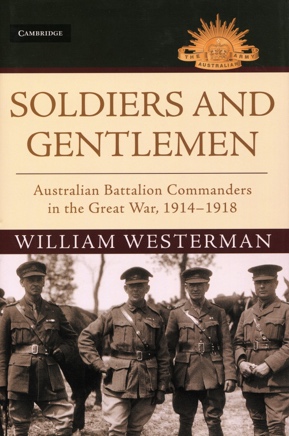One hundred and eighty three men served as the commanding officers (COs) of the 60 infantry battalions in the Australian Imperial Force (AIF). Soldiers and Gentlemen comprehensively examines the background, role and conduct of these men and the unique position they held.

Westerman has arranged his examination in seven chapters focused on raising and training, the lessons of Gallipoli, command turnover, trench warfare on the Western Front, administration and, possibly most importantly, leadership and personal factors. Each chapter has a number of sub-sections that address a wide range of related issues. Westerman has researched deeply and his analysis is honest and sober. He illustrates his points with numerous examples and anecdotes. The book follows a rough chronological progression showing how the AIF learned and adapted as the war progressed.
Westerman explains that “Battalion commanders were not the great captains of the war, they did not make crucial strategic decisions that determined its outcome, but they did make thousands of everyday decisions that affected the lives of hundreds of men under their commands”. He goes on to describe how the COs inhabited a unique leadership position in that while a soldier’s well-being and success in battle was heavily dependent on a CO’s competence, the COs were somewhat removed from the high pressure decision-making and risks faced by junior officers on the battlefield.
There is little doubt that command of an infantry battalion was a difficult and unforgiving appointment. Those who could not produce results were removed, while others were killed and wounded in the course of leading their units. Westerman concludes that successful infantry battalion commanders were those that were competent, adaptive and selfless leaders who cared for the men entrusted to their command. Indeed, for many infantry soldiers in the AIF, their CO’s were the figures that resonated most significantly in their memories.
Westerman is an adjunct lecturer at the University of New South Wales, Canberra, and presently a researcher for the Official History of Australian Operations in Iraq and Afghanistan.
Soldiers and Gentlemen includes 56 black-and-white images and wiring diagrams as well as 17 tables embedded throughout the text, two good-quality maps and three appendices. A comprehensive set of notes, a bibliography and detailed notes make this an academic quality book.
At its heart, this is a story of the challenges of military leadership in war and is, therefore, relevant to students of leadership as well as being a good reference for military historians.
Contact Marcus Fielding about this article.






